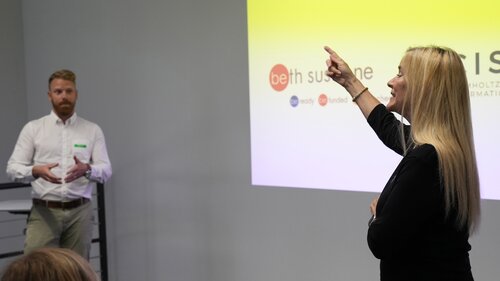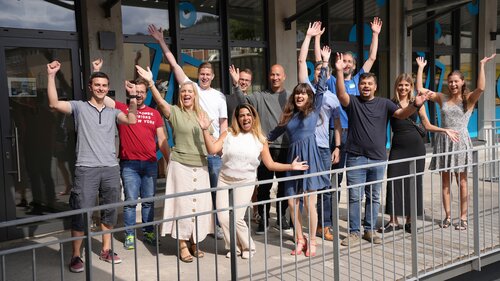The Key to Captivating the Audience: An Interview with Pitch Coach Beth Susanne
The Key to Captivating the Audience: An Interview with Pitch Coach Beth Susanne
Beth, with 25 years of experience you've been supporting many international startups to get funded and launched. I'm sure you've heard countless pitches. What can still impress you after all this time?
After hearing over 3750 pitches from founders, scientists, researchers, corporate venture fund startups, and portfolio companies of VC funds, what still really impresses me is the transformation from their first pitch, when they first start working with me, to the end of the second day of working together, when it is transformed. The whole group, every single one has a transformation that's just amazing. They go from being unclear about what to say, what not to say and how to say it, not clearly expressing the value of what they're doing and why it matters, to clearly articulating the value of what they're doing, why it matters, the impact it's going to have, and what they need in terms of either money or more mentors or other resources – but it's super clear. And that clarity is what it gives you power.
When you give an effective pitch, a really compelling pitch, you speed up your progress dramatically. Most people aren't clear about what it is that the investors or jury panel need to hear. So they say too much of the wrong thing, and they go on and on and lose their audience.
Before Covid, when we could do things in person, (and as we're starting to do again), you had 10 to 30 seconds for people to decide whether you were worthwhile listening to or not. And now when pitching online it can be as little as only three seconds. How you start your pitch, matters. People generally don't understand how important it is to grab their attention at the start, and then hold their attention throughout the whole pitch.
What's the story that you're conveying that matters to the people that are listening to you? I help my clients understand the motivation of the people listening to them. Once you understand what they're looking for and why they should care about your technology or products, then you can adapt what you're saying and how you deliver it in a way that allows them to hear what they want to hear and need to hear. There's a saying: attention is the only currency that matters, and without successfully gaining their attention, nothing happens.
Do pitches work the same all over the world?
I've coached teams from 60 different countries, and I've been to 30 different countries coaching. So in my experience, even in many different cultures the five minute pitch is the same all over the world. You have to talk about the problem, the solution, the market, the business model, your go-to market and your competition.
You have to talk about your team, why you're the right team to be doing this. And then you have to talk about your financial projections in terms of what revenues you think you're going to generate in the next five years. And you need to talk about your ask at the end. That sort of flow is the same the world over.
What changes is during the Q&A. Then you have to be aware of the cultural differences. Because people from different cultures respond differently when they're interacting. Some cultures are task oriented like the US. where they want you to get to the bottom line right away. In the U.S., they want to know what is it that you're doing and why it matters – with no relationship really developing. But there's other cultures that are all relationship based, and a lot of European cultures are more relationship based. However, when in a conversation about raising money with venture capitalists, who see 1200 pitch decks come across their desk every year, and meet with about 500 of the teams…they don't have a lot of time. You have to give them all the information in the five minutes, but what you want them to do in the Q&A is to dive deeper into exploring the impact that you're going to have. What you don't want them to do is to ask questions that say, I didn't understand what you're doing, or process-oriented questions, where they're doubting that you know what you're doing.

Explaining cybersecurity can be quite difficult. Our startups, faculty and PhDs are working on highly complex solutions and technologies. Do you have an ultimate advice on how to succeed in making very complicated things clear to people who are not experts in the field?
Yes. What they need to do is to back away from the immersion in what they're doing and look at what problem are they solving for and why are they doing it. What is the impact of what they're doing? Why does it matter? And when they step back like that, then they start to talk to me in just simple English explaining what they're doing, without using the jargon that they normally use, then any complex subject can become much more understandable. Because when you use jargon, you lose your audience. Only if you're talking to someone who's exactly in your field, can use some jargon. The research shows that even if people, for instance scientists who were pitching to other scientists that are exactly in their field, the ones who use the most jargon were published 26% less than the other scientists who used a bit less jargon. So even if you're in the field, you don't want to listen to too much jargon. It’s a way of being exclusionary, you're cutting people out of your world and saying, I know this, and you don't, which doesn't make people feel like you are trying to include them and truly communicate with them. Because the point of explaining about your technology or your research is so people understand it. So it's basically about stepping back and looking at it from a higher level.
How does working with startups and working with researchers differ in your eyes?
There are differences. When I work with startups, they have a very clear goal. They need to raise money and usually they need to raise within the next six months to a year, sometimes 18 months. They have motivation to really get this right. They need to be able to understand what to say, what not to say and how to say it, so that the investor understands the value of what they're doing. The researchers have a rather longer term goal that's sort of open, meaning there's not just one end point. When they're presenting at a conference, it’s not going to make or break their career. It could influence their career, by raising grant money for example. They could get published and make a big difference, or cited. But it's more about sharing their research so that more people are exposed to it so that they can get more feedback to have more intellectual exchange of ideas. They're not as focused on the longer term impact. There's less pressure and not an end goal.
Which pitch you heard at CISPA impressed you and will be the one you will remember?
My focus is to make everyone shine, rather than to assess who is better than the others. I can see certain people presenting technology that is more easily understood and applicable, and I understand the value of it. There were many startups that were really marketable. I help make sure they convey when the market recognizes the value of what they are doing. I help each and every founder to stand up in front of investors, express their value in a compelling manner, so each one has the best chance possible to raise the funding they need, as quickly as possible. That is my focus.
Thank you so much for the interview.
